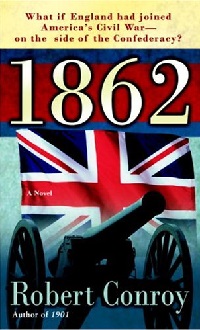
The American Civil War was a civil war in the United States between the Union and the Confederacy, which was formed in 1861 by states that had seceded from the Union. The central conflict leading to war was a dispute over whether slavery should be permitted to expand into the western territories, leading to more slave states, or be prohibited from doing so, which many believed would place slavery on a course of ultimate extinction.

The Confederate States of America (CSA), commonly referred to as the Confederate States (C.S.), the Confederacy, or the South, was an unrecognized breakaway republic in the Southern United States that existed from February 8, 1861, to May 9, 1865. The Confederacy was composed of eleven U.S. states that declared secession and warred against the United States during the American Civil War. The states were South Carolina, Mississippi, Florida, Alabama, Georgia, Louisiana, Texas, Virginia, Arkansas, Tennessee, and North Carolina.
1861 (MDCCCLXI) was a common year starting on Tuesday of the Gregorian calendar and a common year starting on Sunday of the Julian calendar, the 1861st year of the Common Era (CE) and Anno Domini (AD) designations, the 861st year of the 2nd millennium, the 61st year of the 19th century, and the 2nd year of the 1860s decade. As of the start of 1861, the Gregorian calendar was 12 days ahead of the Julian calendar, which remained in localized use until 1923.
1862 (MDCCCLXII) was a common year starting on Wednesday of the Gregorian calendar and a common year starting on Monday of the Julian calendar, the 1862nd year of the Common Era (CE) and Anno Domini (AD) designations, the 862nd year of the 2nd millennium, the 62nd year of the 19th century, and the 3rd year of the 1860s decade. As of the start of 1862, the Gregorian calendar was 12 days ahead of the Julian calendar, which remained in localized use until 1923.

How Few Remain is a 1997 alternate history novel by Harry Turtledove. It is the first part of the Southern Victory saga, which depicts a world in which the Confederate States of America won the American Civil War. It is similar to his earlier novel The Guns of the South, but unlike the latter, it is a purely historical novel with no fantastical or science fiction elements. The book received the Sidewise Award for Alternate History in 1997, and was also nominated for the Nebula Award for Best Novel in 1998. It covers the Southern Victory Series period of history from 1862 and from 1881 to 1882.
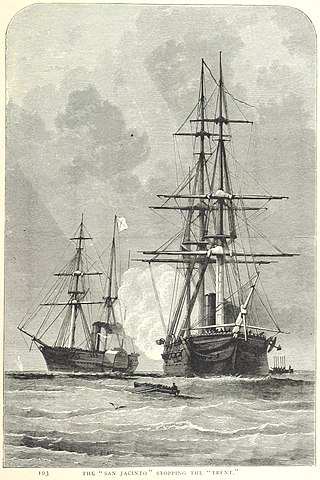
The Trent Affair was a diplomatic incident in 1861 during the American Civil War that threatened a war between the United States and Great Britain. The U.S. Navy captured two Confederate envoys from a British Royal Mail steamer; the British government protested vigorously. American public and elite opinion strongly supported the seizure, but it worsened the economy and was ruining relations with the world's strongest economy and strongest navy. President Abraham Lincoln ended the crisis by releasing the envoys.
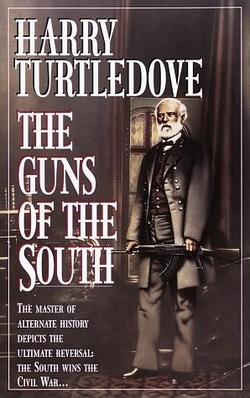
The Guns of the South is a alternate history science fiction novel set during the American Civil War by Harry Turtledove. It was released in the United States on September 22, 1992.
The Southern Victory series or Timeline-191 is a series of eleven alternate history novels by author Harry Turtledove, beginning with How Few Remain (1997) and published over a decade. The period addressed in the series begins during the Civil War and spans nine decades, up to the mid-1940s. In the series, the Confederate States defeats the United States of America in 1862, therefore making good its attempt at secession and becoming an independent nation. Subsequent books are built on imagining events based on this alternate timeline.

There is widespread disagreement among historians about the turning point of the American Civil War. A turning point in this context is an event that occurred during the conflict after which most modern scholars would agree that the eventual outcome was inevitable. The near simultaneous Battle of Gettysburg in the east and fall of Vicksburg in the west, in July 1863 is widely cited as the military climax of the American Civil War. Several other decisive battles and events throughout the war have been proposed as turning points. The events are presented here in chronological order with only the positive arguments for each given.
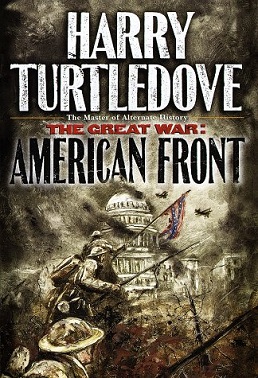
The Great War: American Front is the first alternate history novel in the Great War trilogy by Harry Turtledove. It is the second part of Turtledove's Southern Victory series of novels. It takes the Southern Victory Series from 1914 to 1915.

Settling Accounts: In at the Death is the last novel of the Settling Accounts tetralogy that presents an alternate history of World War II known as the Second Great War that was released July 27, 2007. It brings to a conclusion the multi-series compilation by author Harry Turtledove, a series sometimes referred to as Southern Victory. It covers the time period from 1943 to 1945.
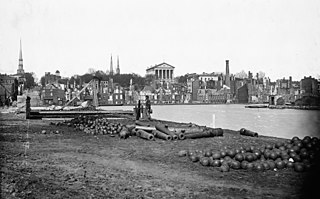
Richmond, Virginia, served as the capital of the Confederate States of America during the American Civil War from May 8, 1861, before that date the capital had been Montgomery, Alabama. Besides its political status, it was a vital source of weapons and supplies for the war effort, as well as the terminus of five railroads, and as such would have been defended by the Confederate States Army at all costs.
The United Kingdom of Great Britain and Ireland remained officially neutral throughout the American Civil War (1861–1865). It legally recognized the belligerent status of the Confederate States of America (CSA) but never recognized it as a nation and neither signed a treaty with it nor ever exchanged ambassadors. Over 90 percent of Confederate trade with Britain ended, causing a severe shortage of cotton by 1862. Private British blockade runners sent munitions and luxuries to Confederate ports in return for cotton and tobacco. In Manchester, the massive reduction of available American cotton caused an economic disaster referred to as the Lancashire Cotton Famine. Despite the high unemployment, some Manchester cotton workers refused out of principle to process any cotton from America, leading to direct praise from President Lincoln, whose statue in Manchester bears a plaque which quotes his appreciation for the textile workers in "helping abolish slavery". Top British officials debated offering to mediate in the first 18 months, which the Confederacy wanted but the United States strongly rejected.

The Second French Empire remained officially neutral throughout the American Civil War and never recognized the Confederate States of America. The United States warned that recognition would mean war. France was reluctant to act without British collaboration, and the British government rejected intervention.
Events from the year 1862 in the United States.

On the onset of the American Civil War in April 1861, Ulysses S. Grant was working as a clerk in his father's leather goods store in Galena, Illinois. When the war began, his military experience was needed, and congressman Elihu B. Washburne became his patron in political affairs and promotions in Illinois and nationwide.
American Civil War alternate histories are alternate history fiction that focuses on the Civil War ending differently or not occurring. The American Civil War is a popular point of divergence in English-language alternate history fiction. The most common variants detail the victory and survival of the Confederate States. Less common variants include a Union victory under different circumstances from actual history, resulting in a different postwar situation; black American slaves freeing themselves by revolt without waiting for Lincoln's Emancipation Proclamation; a direct British and/or French intervention in the war; the survival of Lincoln during John Wilkes Booth's assassination attempt; a retelling of historical events with fantasy elements inserted; the Civil War never breaking out and a peaceful compromise being reached; and secret history tales. The point of divergence in such a story can be a "natural, realistic" event, such as one general making a different decision, or one sentry detecting an enemy invasion unlike in reality. It can also be an "unnatural" fantasy/science fiction plot device such as time travel, which usually takes the form of someone bringing modern weapons or hindsight knowledge into the past. Still another related variant is a scenario of a Civil War that breaks out at a different time from 1861 and under different circumstances.
If the South Had Won the Civil War is a 1961 alternate history book by MacKinlay Kantor, a writer who also wrote several novels about the American Civil War. It was originally published in the November 22, 1960, issue of Look magazine. It generated such a response that it was published in 1961 as a book.
The diplomacy of the American Civil War involved the relations of the United States and the Confederate States of America with the major world powers during the American Civil War of 1861–1865. The United States prevented other powers from recognizing the Confederacy, which counted heavily on Britain and France to enter the war on its side to maintain their supply of cotton and to weaken a growing opponent. Every nation was officially neutral throughout the war, and none formally recognized the Confederacy.
